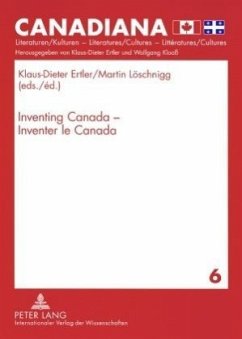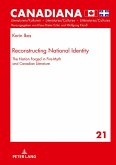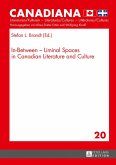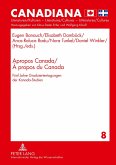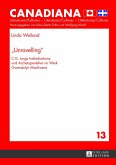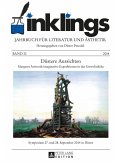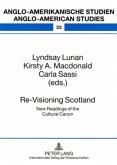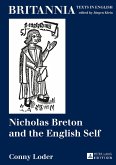Inventing Canada - Inventer le Canada
Herausgegeben:Ertler, Klaus-Dieter; Löschnigg, Martin
Inventing Canada - Inventer le Canada
Herausgegeben:Ertler, Klaus-Dieter; Löschnigg, Martin
- Broschiertes Buch
- Merkliste
- Auf die Merkliste
- Bewerten Bewerten
- Teilen
- Produkt teilen
- Produkterinnerung
- Produkterinnerung
The essays investigate how Canada has pursued the construction of its national identity through symbolic cultural expressions. Analysing manifestations of Canada's cultural memory, the essays therefore engage in a search for the Canada of the mind. In particular, they turn to the fields of cultural and of literary studies to show how writers have projected an image of Canada as a desired space and have rendered the search for meaning within this space. En cette année du quatrième centenaire de la fondation de la ville de Québec, le volume a pour objet de radiographier le concept de l'invention…mehr
Andere Kunden interessierten sich auch für
![Reconstructing National Identity Reconstructing National Identity]() Karin IkasReconstructing National Identity76,30 €
Karin IkasReconstructing National Identity76,30 €![In-Between ¿ Liminal Spaces in Canadian Literature and Cultures In-Between ¿ Liminal Spaces in Canadian Literature and Cultures]() In-Between ¿ Liminal Spaces in Canadian Literature and Cultures80,20 €
In-Between ¿ Liminal Spaces in Canadian Literature and Cultures80,20 €![Apropos Canada / À propos du Canada Apropos Canada / À propos du Canada]() Apropos Canada / À propos du Canada59,95 €
Apropos Canada / À propos du Canada59,95 €![«Unravelling» «Unravelling»]() Linda Weiland«Unravelling»81,70 €
Linda Weiland«Unravelling»81,70 €![inklings ¿ Jahrbuch für Literatur und Ästhetik inklings ¿ Jahrbuch für Literatur und Ästhetik]() inklings ¿ Jahrbuch für Literatur und Ästhetik80,20 €
inklings ¿ Jahrbuch für Literatur und Ästhetik80,20 €![Re-Visioning Scotland Re-Visioning Scotland]() Re-Visioning Scotland67,55 €
Re-Visioning Scotland67,55 €![Nicholas Breton and the English Self Nicholas Breton and the English Self]() Conny LoderNicholas Breton and the English Self77,40 €
Conny LoderNicholas Breton and the English Self77,40 €-
-
-
The essays investigate how Canada has pursued the construction of its national identity through symbolic cultural expressions. Analysing manifestations of Canada's cultural memory, the essays therefore engage in a search for the Canada of the mind. In particular, they turn to the fields of cultural and of literary studies to show how writers have projected an image of Canada as a desired space and have rendered the search for meaning within this space.
En cette année du quatrième centenaire de la fondation de la ville de Québec, le volume a pour objet de radiographier le concept de l'invention de la nation canadienne. Nous savons que la configuration nationale du Canada, ainsi que celle du Québec, est loin d'être acquise, et qu'il faut se demander dans quelle mesure ce concept en question relève d'une donnée historique ou bien plutôt d'un travail imaginaire sur un ensemble culturel vaguement défini. Nous avons réuni les analyses de spécialistes pour la plupart d'origine centre-européenne afin de fournir des réponses adéquates au fait littéraire et culturel de l'invention de la nation canadienne ou québécoise.
En cette année du quatrième centenaire de la fondation de la ville de Québec, le volume a pour objet de radiographier le concept de l'invention de la nation canadienne. Nous savons que la configuration nationale du Canada, ainsi que celle du Québec, est loin d'être acquise, et qu'il faut se demander dans quelle mesure ce concept en question relève d'une donnée historique ou bien plutôt d'un travail imaginaire sur un ensemble culturel vaguement défini. Nous avons réuni les analyses de spécialistes pour la plupart d'origine centre-européenne afin de fournir des réponses adéquates au fait littéraire et culturel de l'invention de la nation canadienne ou québécoise.
Produktdetails
- Produktdetails
- Canadiana 6
- Verlag: Peter Lang
- Artikelnr. des Verlages: 57852
- Seitenzahl: 310
- Englisch, Französisch
- Abmessung: 16mm x 148mm x 210mm
- Gewicht: 400g
- ISBN-13: 9783631578520
- ISBN-10: 3631578520
- Artikelnr.: 27566786
- Herstellerkennzeichnung Die Herstellerinformationen sind derzeit nicht verfügbar.
- Canadiana 6
- Verlag: Peter Lang
- Artikelnr. des Verlages: 57852
- Seitenzahl: 310
- Englisch, Französisch
- Abmessung: 16mm x 148mm x 210mm
- Gewicht: 400g
- ISBN-13: 9783631578520
- ISBN-10: 3631578520
- Artikelnr.: 27566786
- Herstellerkennzeichnung Die Herstellerinformationen sind derzeit nicht verfügbar.
Contents/Contenu : David Staines: The Pillars of Canadian Non-Fiction: Innis, McLuhan, and Frye - Martin Kuester: From the Four Victim Positions to the Three Stages of Nowhere: On the Use of Negative Imagery in Canadian Literary Criticism - Gilles Dupuis : La redécouverte de Québec par Andrée Maillet et Jacques Poulin - Peter Klaus : Les écrivains francophones du Canada se réapproprient leur histoire et leur territoire ? - Petr Kylousek : Le rêve américain de Noël Audet - Józef Kwaterko : Montréal chez les écrivains haïtiens du Québec - Éva Martonyi : Est-ce que la littérature crée l'identité ? - Margareta Gyurcsik : Il était une fois une île - Klaus-Dieter Ertler : La mise en fiction d'un clivage idéologique : L'été de 1939 avant l'orage de Jean-Pierre Charland - Nora Tunkel: Deconstructing the Multicultural Myth - Transcultural Imaginaries in Madeleine Thien's Certainty - Maria Löschnigg: «My prairie blood surging in recognition»: Re- and De-Inventions of the Prairie in Contemporary Canadian Literature - Martin Löschnigg: «A Tadmore in the desert»: John Galt's Vision of a Canadian Civil Society - Waldemar Zacharasiewicz: Women's Voices in Pre-Confederation Canada and the European Heritage - Voichita-Maria Sasu : Au pays du castor : Les Engagés du Grand Portage de Léo-Paul Desrosiers - Natalia Vid: The symbol of the City in Morley Callaghan's Strange Fugitive: Adaptation of American Urban Discourse or Reinforcement of Canadian Multicultural Identity? - Eugen Banauch: Austrian Canadian Cosmopolitanism, Transcultural Optimism, and Exilic Despair: Carl Weiselberger and Charles Wassermann - Alessandra Ferraro : Autobiographie, biographie, hagiographie : la construction du mythe de Marie de l'Incarnation - Ursula Mathis-Moser : « Un tableau de Van Gogh ». Observations à propos de l'hymne national du Canada - Ljiljana Matic : Le passage du patrimoine européen à l'invention du mythe du Nouveau Monde : contes et légendes - Krzysztof Jarosz : La naissance mythique de la poésie québécoise métissée. Le Petit Aigle à Tête blanche de Robert Lalonde - Gordon Bölling: «A Part of Our History that So Few Know About»: Native Involvement in Canada's Great War - Joseph Boyden's Three Day Road - Hartmut Lutz: «Inventing» Canada's Aboriginal Peoples: Métis Moving From Invisibility to International Interaction - Jason Blake: Hockey and the (Ironic) Invention of Canada - Hans-Jürgen Lüsebrink : L'invention encyclopédique du Canada - La Nouvelle France dans les encyclopédies de langue française au Siècle des Lumières.Contents/Contenu : David Staines: The Pillars of Canadian Non-Fiction: Innis, McLuhan, and Frye - Martin Kuester: From the Four Victim Positions to the Three Stages of Nowhere: On the Use of Negative Imagery in Canadian Literary Criticism - Gilles Dupuis : La redécouverte de Québec par Andrée Maillet et Jacques Poulin - Peter Klaus : Les écrivains francophones du Canada se réapproprient leur histoire et leur territoire ? - Petr Kylousek : Le rêve américain de Noël Audet - Józef Kwaterko : Montréal chez les écrivains haïtiens du Québec - Éva Martonyi : Est-ce que la littérature crée l'identité ? - Margareta Gyurcsik : Il était une fois une île - Klaus-Dieter Ertler : La mise en fiction d'un clivage idéologique : L'été de 1939 avant l'orage de Jean-Pierre Charland - Nora Tunkel: Deconstructing the Multicultural Myth - Transcultural Imaginaries in Madeleine Thien's Certainty - Maria Löschnigg: "My prairie blood surging in recognition": Re- and De-Inventions of the Prairie in Contemporary Canadian Literature - Martin Löschnigg: "A Tadmore in the desert": John Galt's Vision of a Canadian Civil Society - Waldemar Zacharasiewicz: Women's Voices in Pre-Confederation Canada and the European Heritage - Voichita-Maria Sasu : Au pays du castor : Les Engagés du Grand Portage de Léo-Paul Desrosiers - Natalia Vid: The symbol of the City in Morley Callaghan's Strange Fugitive : Adaptation of American Urban Discourse or Reinforcement of Canadian Multicultural Identity? - Eugen Banauch: Austrian Canadian Cosmopolitanism, Transcultural Optimism, and Exilic Despair: Carl Weiselberger and Charles Wassermann - Alessandra Ferraro : Autobiographie, biographie, hagiographie : la construction du mythe de Marie de l'Incarnation - Ursula Mathis-Moser : " Un tableau de Van Gogh ". Observations à propos de l'hymne national du Canada - Ljiljana Matic : Le passage du patrimoine européen à l'invention du mythe du Nouveau Monde : contes et légendes - Krzysztof Jarosz : La naissance mythique de la poésie québécoise métissée. Le Petit Aigle à Tête blanche de Robert Lalonde - Gordon Bölling: "A Part of Our History that So Few Know About": Native Involvement in Canada's Great War - Joseph Boyden's Three Day Road - Hartmut Lutz: "Inventing" Canada's Aboriginal Peoples: Métis Moving From Invisibility to International Interaction - Jason Blake: Hockey and the (Ironic) Invention of Canada - Hans-Jürgen Lüsebrink : L'invention encyclopédique du Canada - La Nouvelle France dans les encyclopédies de langue française au Siècle des Lumières.
Contents/Contenu : David Staines: The Pillars of Canadian Non-Fiction: Innis, McLuhan, and Frye - Martin Kuester: From the Four Victim Positions to the Three Stages of Nowhere: On the Use of Negative Imagery in Canadian Literary Criticism - Gilles Dupuis : La redécouverte de Québec par Andrée Maillet et Jacques Poulin - Peter Klaus : Les écrivains francophones du Canada se réapproprient leur histoire et leur territoire ? - Petr Kylousek : Le rêve américain de Noël Audet - Józef Kwaterko : Montréal chez les écrivains haïtiens du Québec - Éva Martonyi : Est-ce que la littérature crée l'identité ? - Margareta Gyurcsik : Il était une fois une île - Klaus-Dieter Ertler : La mise en fiction d'un clivage idéologique : L'été de 1939 avant l'orage de Jean-Pierre Charland - Nora Tunkel: Deconstructing the Multicultural Myth - Transcultural Imaginaries in Madeleine Thien's Certainty - Maria Löschnigg: «My prairie blood surging in recognition»: Re- and De-Inventions of the Prairie in Contemporary Canadian Literature - Martin Löschnigg: «A Tadmore in the desert»: John Galt's Vision of a Canadian Civil Society - Waldemar Zacharasiewicz: Women's Voices in Pre-Confederation Canada and the European Heritage - Voichita-Maria Sasu : Au pays du castor : Les Engagés du Grand Portage de Léo-Paul Desrosiers - Natalia Vid: The symbol of the City in Morley Callaghan's Strange Fugitive: Adaptation of American Urban Discourse or Reinforcement of Canadian Multicultural Identity? - Eugen Banauch: Austrian Canadian Cosmopolitanism, Transcultural Optimism, and Exilic Despair: Carl Weiselberger and Charles Wassermann - Alessandra Ferraro : Autobiographie, biographie, hagiographie : la construction du mythe de Marie de l'Incarnation - Ursula Mathis-Moser : « Un tableau de Van Gogh ». Observations à propos de l'hymne national du Canada - Ljiljana Matic : Le passage du patrimoine européen à l'invention du mythe du Nouveau Monde : contes et légendes - Krzysztof Jarosz : La naissance mythique de la poésie québécoise métissée. Le Petit Aigle à Tête blanche de Robert Lalonde - Gordon Bölling: «A Part of Our History that So Few Know About»: Native Involvement in Canada's Great War - Joseph Boyden's Three Day Road - Hartmut Lutz: «Inventing» Canada's Aboriginal Peoples: Métis Moving From Invisibility to International Interaction - Jason Blake: Hockey and the (Ironic) Invention of Canada - Hans-Jürgen Lüsebrink : L'invention encyclopédique du Canada - La Nouvelle France dans les encyclopédies de langue française au Siècle des Lumières.Contents/Contenu : David Staines: The Pillars of Canadian Non-Fiction: Innis, McLuhan, and Frye - Martin Kuester: From the Four Victim Positions to the Three Stages of Nowhere: On the Use of Negative Imagery in Canadian Literary Criticism - Gilles Dupuis : La redécouverte de Québec par Andrée Maillet et Jacques Poulin - Peter Klaus : Les écrivains francophones du Canada se réapproprient leur histoire et leur territoire ? - Petr Kylousek : Le rêve américain de Noël Audet - Józef Kwaterko : Montréal chez les écrivains haïtiens du Québec - Éva Martonyi : Est-ce que la littérature crée l'identité ? - Margareta Gyurcsik : Il était une fois une île - Klaus-Dieter Ertler : La mise en fiction d'un clivage idéologique : L'été de 1939 avant l'orage de Jean-Pierre Charland - Nora Tunkel: Deconstructing the Multicultural Myth - Transcultural Imaginaries in Madeleine Thien's Certainty - Maria Löschnigg: "My prairie blood surging in recognition": Re- and De-Inventions of the Prairie in Contemporary Canadian Literature - Martin Löschnigg: "A Tadmore in the desert": John Galt's Vision of a Canadian Civil Society - Waldemar Zacharasiewicz: Women's Voices in Pre-Confederation Canada and the European Heritage - Voichita-Maria Sasu : Au pays du castor : Les Engagés du Grand Portage de Léo-Paul Desrosiers - Natalia Vid: The symbol of the City in Morley Callaghan's Strange Fugitive : Adaptation of American Urban Discourse or Reinforcement of Canadian Multicultural Identity? - Eugen Banauch: Austrian Canadian Cosmopolitanism, Transcultural Optimism, and Exilic Despair: Carl Weiselberger and Charles Wassermann - Alessandra Ferraro : Autobiographie, biographie, hagiographie : la construction du mythe de Marie de l'Incarnation - Ursula Mathis-Moser : " Un tableau de Van Gogh ". Observations à propos de l'hymne national du Canada - Ljiljana Matic : Le passage du patrimoine européen à l'invention du mythe du Nouveau Monde : contes et légendes - Krzysztof Jarosz : La naissance mythique de la poésie québécoise métissée. Le Petit Aigle à Tête blanche de Robert Lalonde - Gordon Bölling: "A Part of Our History that So Few Know About": Native Involvement in Canada's Great War - Joseph Boyden's Three Day Road - Hartmut Lutz: "Inventing" Canada's Aboriginal Peoples: Métis Moving From Invisibility to International Interaction - Jason Blake: Hockey and the (Ironic) Invention of Canada - Hans-Jürgen Lüsebrink : L'invention encyclopédique du Canada - La Nouvelle France dans les encyclopédies de langue française au Siècle des Lumières.

